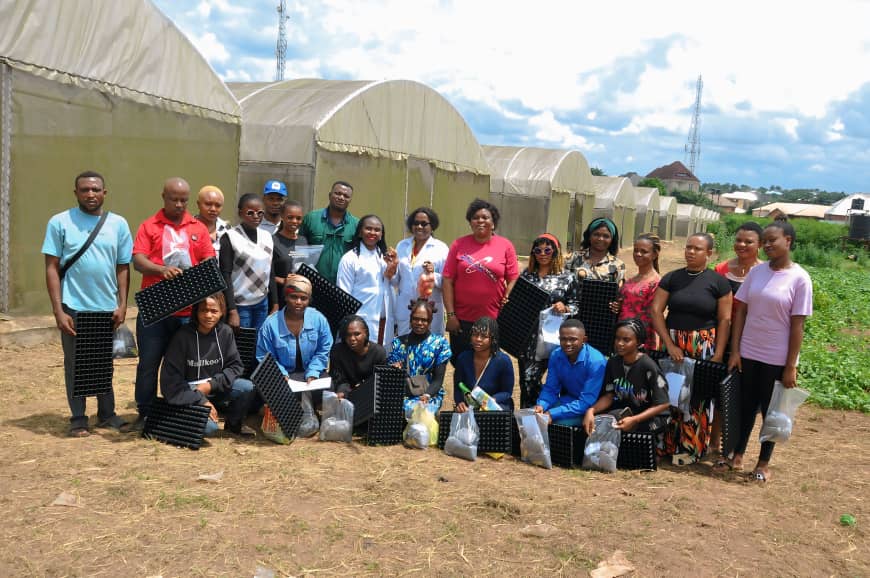The Michael Okpara University of Agriculture, Umudike (MOUAU), in collaboration with the Science and Technical Committee of the Nigerian Institute of Food Science and Technology (NIFST) and the Hope for Farmers Women and Girls Initiative (HOFWGI), has launched the Cohort 1.0 Youth Empowerment and Agricultural Skills Training. The practical initiative is designed to equip young people from the university’s host communities and beyond with hands-on skills in tomato and pepper cultivation as well as value addition through processing.
Declaring the training open, the Sixth Vice-Chancellor of the University, Prof. Maduebibisi Ofo Iwe, said the initiative reflects the university’s strong commitment to community development, food security, and youth empowerment.
Represented by the Deputy Vice-Chancellor (Academic), Prof. Nneoma Elechi Obasi, the Vice-Chancellor explained that 23 youths were selected for the first phase of the training, which focuses on the entire process of tomato and pepper cultivation — from nursery establishment to harvesting.

“We are empowering Abia youths through this initiative. Our goal is to first train young people from four university host communities — Umudike, Umudike Ukwu, Okwu Olokoro Autonomous Community, and Umuopara Ozara Olokoro Autonomous Community,” Prof. Obasi stated.
She described the programme as a hands-on training designed to engage participants practically and help them become productive entrepreneurs.
“In addition to farm-based instruction, participants are receiving laboratory training on processing techniques to extract and produce tomato-based products such as juice, purée, ketchup, drinks, and tomato powder.
“We are empowering them to make good use of their time and become useful to themselves and their communities. This training can spark something in them that will inspire future entrepreneurship,” she emphasized.
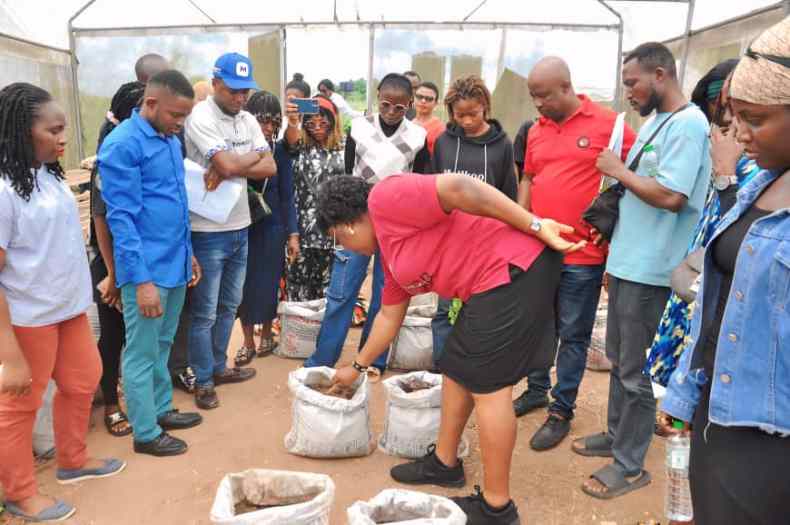
She further revealed that the initiative adopts a ‘Train-the-Trainer’ model, under which four participants were selected from each community. Those trained will, in turn, extend the knowledge to other youths in their localities, thereby expanding the programme’s impact.
Earlier in her remarks, the Director of the Centre for Gender, Youth and Child Development, Prof. Mabel Ifeoma Onwuka, described the project as a long-term empowerment drive aimed at giving back to society while promoting agricultural innovation.
“We are here to empower the youths, starting from our university host community. We are doing it in phases, and the essence is to give back to society,” she noted.
Prof. Onwuka who is also the Supervisor MOUAU Greenhouse Project on Tomatoes and Peppers Production, further explained that the training also equips participants with starter kits comprising seeds, manure, and other necessary materials to help them establish their farms after the programme.
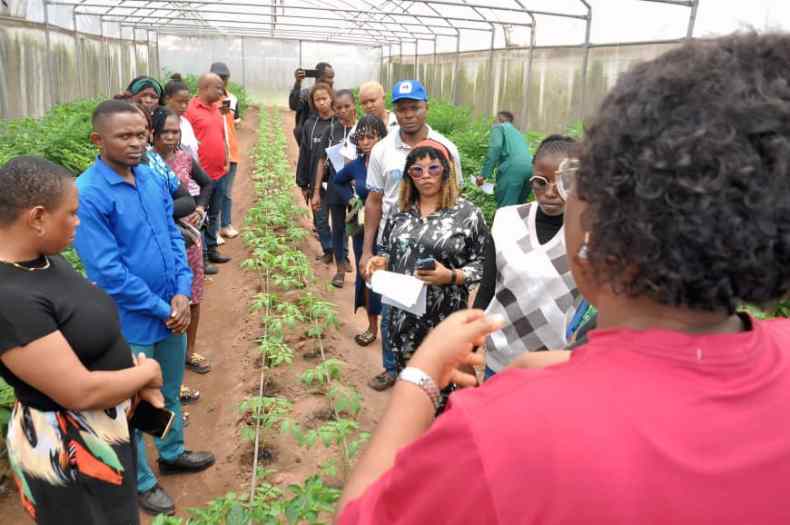
“We will keep track of their progress and provide follow-up support to ensure sustainability,” she said.
She added that the programme, implemented by the Centre for Gender, Youth and Child Development in collaboration with the Hope for Farmers Women and Girls Initiative (HOFWGI) and the Department of Food Science and Technology, will be sustained and expanded to accommodate more participants in future cohorts.
“After this cohort, the next batch will also be trained to expand knowledge, improve livelihoods, and ensure food and nutritional security in Nigeria,” she assured.
Onwuka emphasized that beyond food production, the initiative seeks to foster peace and stability within local communities by meaningfully engaging youths in productive ventures, thereby reducing restiveness and unemployment.
They also appealed to Governors in the South-East and South-South regions and other tiers of government to prioritize food security by investing in youth-driven agricultural programmes.
“Governments should take advantage of the strength and creativity of our youths to boost agriculture and ensure food sufficiency,” Prof. Onwuka urged.
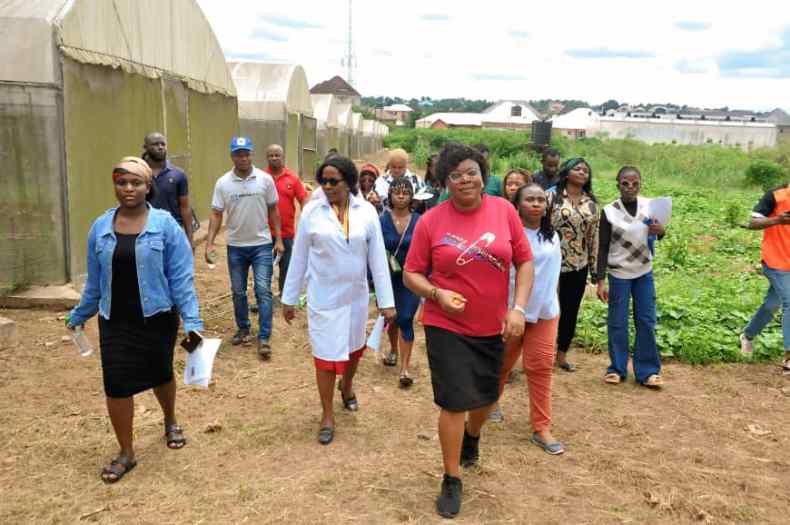
She stressed that greater investment in irrigation and modern farming techniques would enable all-year-round cultivation of key crops, thereby boosting food availability and rural livelihoods.
The Agriculturist described the programme as part of MOUAU’s Corporate Social Responsibility (CSR) and reaffirmed that it aligns with the university’s broader mission to use agricultural knowledge for sustainable community transformation and national food security.
“This is an extension of knowledge — our contribution to society. We want to ensure that every household has enough food, adequate nutrition, and the purchasing power to sustain it. If this training is practiced, it will positively impact both the micro and macro economy,” she stated.
The Professor of Soil Science who trained the youths from Cultivation to harvesting stages of tomatoes and peppers, encouraged the participants to maintain close contact with the university for continuous mentorship and support.
“The university doors are open. The trainees are free to come in for further clarifications and free consultations as they implement what they have learned,” Prof. Onwuka noted.
The Cohort 1.0 Youth Empowerment Programme represents a vital step in MOUAU’s ongoing efforts to promote agricultural innovation, enhance youth self-reliance, and strengthen Nigeria’s food and nutritional security.
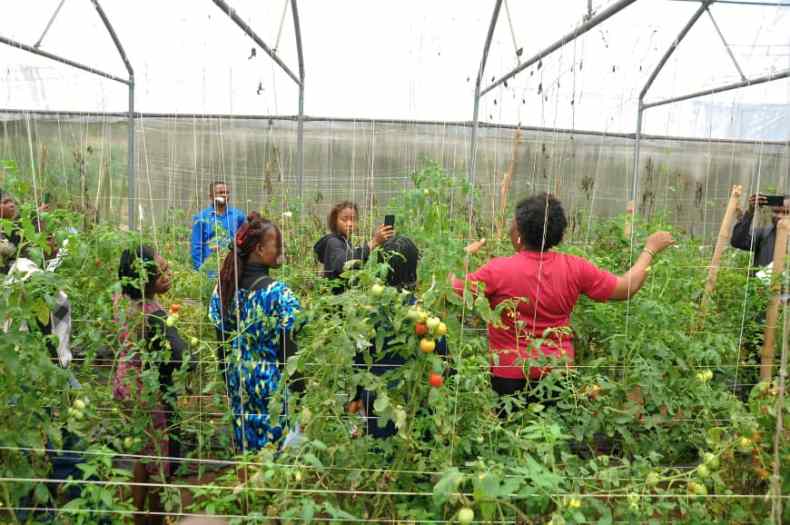
Prof. Onwuka also demonstrated the production and use of biochar as a sustainable and affordable fertilizer to improve soil fertility and boost tomato and pepper production in Southeast Nigeria. She described biochar as an eco-friendly product made from agricultural waste such as crop residues, rice husks, and animal dung through a controlled heating process known as pyrolysis.
Explaining during a demonstration session with youths, Prof. Onwuka explained that applying biochar to the region’s degraded and acidic soils helps increase crop yield, enhance nutrient availability, and improve soil structure. She added that biochar enriches the soil with essential nutrients like phosphorus, calcium, and potassium while supporting beneficial microorganisms.
According to her, biochar offers farmers a low-cost alternative to chemical fertilizers, making it ideal for smallholder farmers cultivating tomatoes and peppers. She emphasized that the technology not only recycles agricultural waste into valuable farm inputs but also helps mitigate climate change by reducing greenhouse gas emissions during production.
She also commended Mrs. Kasie Okagbu from the Department of Food Science and Technology, who showcased various local food products such as Monkey Kola and demonstrated juice extraction from indigenous crops.
In a vote of thanks, Mr Chibueze Onyejuruwa. expressed appreciation to the university for providing the participants with the opportunity to be trained, describing the programme as a fulfillment of their long-held aspirations.
He noted that with the skills and knowledge gained from the training, the beneficiaries are now better equipped to plant tomatoes and peppers in bags, also venture into other agribusinesses to create wealth, and achieve economic stability.
Highlight of the programme was the free distribution of starter kits which comprise of seeds (tomatoes and pepper), fungicides, nursery trays, organic and inorganic fertilizers, among others to youths to enable them kick-start tomato and pepper cultivation and processing.
Others present at event were Ms Esther Ugwu and Mrs Oluomachi Ebogu.
By Chukwuemeka Egejuru

